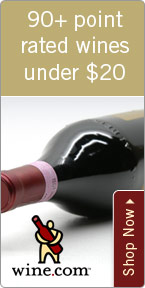Tasting Wine From The Barrel

Wednesday - June 30, 2006
| Share
 Del.icio.us
Del.icio.usSo what’s the deal with barrel sampling? No, not sticking your nose into a freshly toasted barrel. I mean when people actually taste wines from the barrel or vat even before it’s been bottled.
You know those big wine publications that give you a forecast as to the quality of wines long before they are even ready to drink? Maybe you’ve even had the chance to travel to wine country and visit wine-makers who welcome you into the winery to taste directly from the barrels. What a romantic notion, and yet quite a necessary evil in the business of wine.
I will be the first to tell you that barrel sampling is a necessity in many cases in the wine world, firstly and most evidently when people are able to purchase wines even before the wine is bottled and ready for sale. This happens most notably and with great attention in Bordeaux. Retailers and distributors alike descend upon Bordeaux in early spring each year to taste the recently fermented wine in order to get an impression of the quality of the wines that they wish to sell to their clients. Wine writers are there to give their points and never-to-be-humble critiques, as well.
Bordeaux is not exclusive in this habit as there are other wineries around the world that use the same form of “pre-selling” to generate revenue. Chateau Montelena in Napa Valley and even Penfolds in Australia both come to mind. It’s also necessary for negotiants. A negotiant is anyone who purchases wines from smaller producers and blends it and bottles it under their own labels. There are plenty of negotiants that you are probably familiar with. Joseph Drouhin, Louis Latour, Barton & Guestier, Guigal and even Kendall Jackson and Robert Mondavi purchase fruit or wine from smaller producers for their myriad of labels. In order to maintain the quality, people have to taste the wine to decide whom to buy from and what to refuse.
There is also the important factor of time. As in the news-room, you are either quick or dead. The sooner people can taste the quality of wine, the sooner they can buy it all up, let others know how good or bad they are, get their ratings and notes up on the Web and in print for everyone else to see.
No one wants to be the last in line.
So much for the pros; here are the cons. First of all, I would say that unless you are an experienced taster, tasting barrel samples can be very difficult and even off-putting. It is still somewhat petillant, there are plenty of tannins and lots of aromas that you’re not used to tasting in finished wines.
Second, depending on when you taste the wine, there is so much that can still happen to it before it’s in the bottle. Maybe the winemaker decides to filter it, stripping away some nuance and flavor. Maybe they go on vacation and don’t make sure to top off the barrels, causing them to oxidize and pick up a shoyu-like off flavor. Or they decide to keep it in the barrel or vat longer than expected, losing fruitiness and picking up heavier woody or reductive character respectively. I’ve heard plenty of stories where someone says, “That’s not what it tasted like when we tasted it from barrel!” Of course it’s not.
And not least of all, it is almost impossible for anyone to predict how a wine will change over time. We can only speculate as to when we think the wine will drink “at its best” (even that is subjective) or when it should be bottled. Time changes everything with wine.
Personally, I love to taste wines that are not yet bottled, but I also try them again after they are bottled, and then over their lifespan. It’s like a person - you can’t just have one date, then think you know the person, no matter how good the date. You have to spend time with them over a long period, get to know them inside and out. Then you get the true picture. Barrel tasting is only a snapshot or just a glimpse of what is to come.
A couple of really promising “glimpses”:
2005 Chateau Brane Cantenac, Margaux, Bordeaux (est. $55) eta 2007. High intensity black fruit, cassis, plum. Powerful nose; very well made, I like this. High concentration, long aftertaste, great fruit.
2004 Olivier Savary Chablis 1er Cru ‘Fourchaume’ (est. $27) eta July 2006. Super elegant and refined wine, tons of beautiful fruit. Like driving on a newly paved road. Yes, I should buy some for cellar, too.
Roberto Viernes is a master sommelier. E-mail .(JavaScript must be enabled to view this email address)E-mail this story | Print this page | Comments (0) | Archive | RSS Comments (0) |
Most Recent Comment(s):












